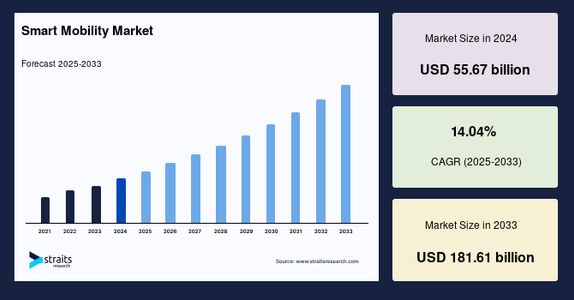Smart Mobility Market: Trends, Segments, Key Players, and Growth Outlook
 Researcher Marketing
20 Aug, 2025
8 mins read
38
Researcher Marketing
20 Aug, 2025
8 mins read
38

The global Smart Mobility Market is undergoing a major transformation, driven by rapid urbanization, sustainability goals, and innovations in digital and automotive technologies. In 2024, the market was valued at more than USD 55 billion and is projected to grow beyond USD 180 billion by 2033, expanding at a compound annual growth rate (CAGR) of over 14%. This remarkable growth reflects the increasing need for integrated, technology-driven mobility solutions that ease urban congestion, reduce carbon emissions, and create safer, more efficient transport ecosystems.
Regional Trends
- North America currently leads the global market, accounting for close to 40% share. The region’s early adoption of connected vehicles, strong digital infrastructure, and favorable government initiatives have accelerated smart mobility adoption. Major cities in the U.S. and Canada are also integrating smart traffic management and Mobility-as-a-Service (MaaS) platforms to streamline transportation.
- Asia-Pacific is the fastest-growing region, propelled by rapid urbanization, expanding middle-class populations, and government-backed smart city projects. Countries like China, India, South Korea, and Japan are witnessing a surge in shared mobility services, electric vehicles, and intelligent public transport solutions.
- Europe demonstrates strong growth as well, with cities focusing on sustainability and stricter emission regulations. Nations such as Germany, France, and Italy are actively testing autonomous shuttles, investing in green transport, and integrating multimodal mobility services.
Market Segments (XYZ)
The smart mobility market is broadly segmented across types, technologies, and modes of transportation.
- By Type (X):
- Integrated Mobility Platforms
- Smart Transportation Solutions
- Mobility-as-a-Service (MaaS)
- Traffic Management Systems
- Connected Vehicle Solutions
- By Technology (Y):
- Internet of Things (IoT)
- Artificial Intelligence (AI)
- Blockchain
- Cloud Computing
- Big Data Analytics
- By Transport Mode / Offering (Z):
- Shared Mobility Services (carpooling, ride-hailing, bike-sharing)
- Public Transport (smart buses, metro systems)
- Electric Vehicles (EVs) and Hybrid Vehicles
- Rail and Smart Logistics
- Autonomous Vehicles
Recent insights highlight that bike commuting and shared mobility platforms are gaining significant traction, while traffic management systems remain the dominant solution segment. Meanwhile, MaaS is expanding rapidly, reshaping how consumers view transportation as a service rather than a product.
Top Players (AB)
The Smart Mobility landscape is shaped by a diverse group of automakers, technology companies, and service providers:
- Automotive Giants: Volkswagen, Toyota, Ford, BMW, and Hyundai are heavily investing in smart vehicle technology and connected solutions.
- Technology Leaders: Bosch, Siemens, Intel, Cisco, and Huawei are enabling the digital backbone of connected mobility with IoT, AI, and 5G solutions.
- Mobility Service Providers: Uber, Lyft, Waymo, Lime, and TomTom are at the forefront of shared mobility, ride-hailing, and autonomous vehicle deployment.
- Innovators and Startups: WeRide and May Mobility are advancing autonomous shuttles and robotaxis, while regional leaders like BluSmart Mobility and SUN Mobility in India are innovating in electric shared mobility and battery-swapping networks.
Market Drivers
- Urbanization and Congestion: Growing urban populations are creating demand for efficient, technology-enabled mobility solutions that reduce travel time and congestion.
- Sustainability Goals: Rising awareness about climate change and government emission regulations are driving the adoption of EVs and eco-friendly transport.
- Technological Advances: Rapid progress in AI, IoT, and 5G is enabling smarter, safer, and more connected transport ecosystems.
- Autonomous Mobility: Testing and deployment of autonomous vehicles and shuttles are gaining traction across major cities, revolutionizing urban transportation.
- Government Support: Smart city programs, subsidies for EV adoption, and investments in digital infrastructure are fueling adoption worldwide.
Challenges
- Regulatory Barriers: Fragmented laws and differing regulations across countries slow down the rollout of autonomous vehicles and integrated platforms.
- Infrastructure Gaps: High costs and inadequate infrastructure in developing regions hinder large-scale adoption.
- Cybersecurity Risks: With connected vehicles and data-driven systems, concerns over data privacy and cyberattacks remain significant.
- Profitability Issues: Shared mobility and ride-hailing providers face challenges balancing affordability, driver earnings, and profitability.
- Technology Uncertainty: Safety concerns and engineering complexities in autonomous vehicles delay mass adoption.
Frequently Asked Questions (FAQs)
Q: What is the size of the Smart Mobility Market?
A: The market was valued at around USD 55–68 billion in 2024 and is expected to exceed USD 180 billion by 2033, growing at a CAGR of over 14%.
Q: Which region leads the market?
A: North America currently dominates, but Asia-Pacific is the fastest-growing region, thanks to urbanization and large-scale smart city initiatives.
Q: What are the main market segments?
A: Core segments include MaaS, traffic management systems, connected vehicles, IoT and AI-based solutions, shared mobility platforms, and EV adoption.
Q: Who are the top players?
A: Global leaders include automakers like Volkswagen, Toyota, and BMW, technology providers like Bosch and Huawei, and service providers like Uber, Lyft, and Waymo, alongside innovators such as WeRide, May Mobility, and BluSmart.
Q: What drives the market growth?
A: Urban congestion, sustainability targets, government policies, and rapid advancements in connected and autonomous vehicle technologies.
For more insights, access detailed reports here:
Written By:
Researcher Marketing



Hotels at your convenience
Now choose your stay according to your preference. From finding a place for your dream destination or a mere weekend getaway to business accommodations or brief stay, we have got you covered. Explore hotels as per your mood.





